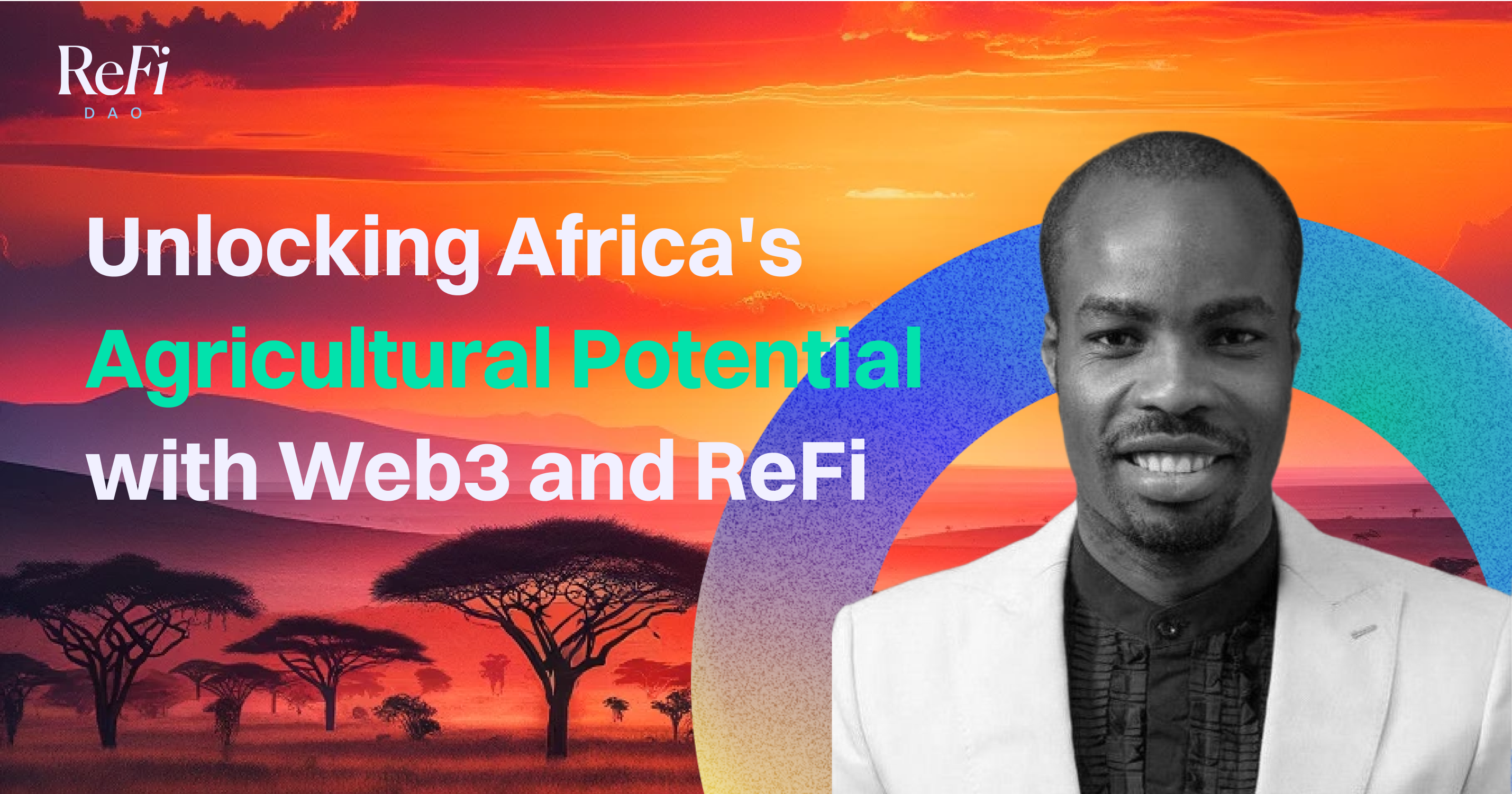Unlocking Africa's Agricultural Potential with Web3 and Regenerative Finance 🌿 🌻
Africa's fertile lands hold untapped potential amidst climate threats; Web3 and regenerative finance offer innovative solutions.

TL;DR
Africa, a continent of diverse ecosystems and rich agricultural potential, faces a dual challenge. The value locked within its vast agricultural real estate remains untapped, while the delicate balance of biodiversity is threatened by climate change. In this article, Simon explores the transformative potential of Web3 and regenerative finance in addressing these challenges while promoting agricultural real estate and delving into risks and considerations.
Let's dive in 👇
Introduction: Unveiling The Challenge And Opportunity 👥
The UN Food and Agriculture Organization (FAO) estimates that more than half of the world's agricultural land is degraded. This threatens global food security and results in $400 billion in annual productivity losses. Agriculture, which today is responsible for approximately one-third of greenhouse gas (GHG) emissions, may hold the key to mitigating and adjusting to climate change. Smallholder farmers, especially those in the global south, are essential to accelerating the world's transition to net-zero emissions.
Agriculture in Africa has been a promising area, employing more Africans than other sectors. With 60% of the world's uncultivated arable land, agriculture accounts for 35% of Africa's GDP. Despite contributing to the economy, agricultural land in Africa faces many challenges. These include poor land tenure systems, governance, limited financing, and climate change. These restrictions have impeded the growth of agricultural real estate and increased food imports.
Imagine Mama Nkechi, a smallholder farmer in Abia, cultivating her 2-acre farmland. Her dreams of expanding her farming operations were thwarted by the harsh reality of financial exclusion. Traditional banks claim her farm is too small and her earnings are too unstable to justify investment. However, within this paradox lies a revolutionary seed - a vision powered by the potent synergy of Web3 and regenerative finance (ReFi).
Exploring Nature As An Asset Class: Tokenized Real Estate 🔓
According to FAO data, over 90% of smallholder farmers in Africa lack access to formal credit, limiting their investment in agricultural land and food production. This has resulted in rural-urban migration, talent flight (japa), and dead assets. A PwC report estimates that Nigeria alone has residential real estate and agricultural land valued at least $300 billion in dead assets. The country has over 35 million hectares of arable land with just 40% of it being used.
The concept of tokenization- the process of issuing digital representations of physical assets on a blockchain, is changing the global investment landscape. The Boston Consulting Group estimates that tokenizing real-world assets (RWAs) could become a $16 trillion industry in the coming years. Its impact, however, goes well beyond financial figures and can help smallholder farmers in Africa find new ways to deal with real-world problems such as dead assets.
Real estate tokenization on Web3 is a pivotal tool in democratizing access to agricultural real estate investments, effectively breaking down barriers to entry and opening up opportunities for a more extensive array of investors, including retail investors.
By developing robust legal frameworks for sustainable agriculture and Web3 applications, millions of smallholder farmers can transform their static agricultural land (dead assets) into digital assets, dividing it into fractional, tradable tokens accessible to a pool of global Web3 investors. This would promote sustainable land use and open the door to microloans, empowering smallholder farmers to invest in modern irrigation systems, climate-smart agriculture (CSA), and indigenous seeds. The Landbanking Group project is already leveraging technology to build trust and align interests between nature, business, and humanity.
🌱 Digital Land Registry: Use-Case
Despite the agricultural opportunities and enabling technologies, real estate investment in Africa is hampered by ambiguous land rights. Only about 10% of land in Sub-Sahara Africa is formally documented, creating a web of confusion that discourages investments. HouseAfrica, an African proptech, is addressing this issue using satellite technology and a blockchain-powered land registry for real estate developers and buyers.
Project Shamba Network also employs satellite technology— digital monitoring, reporting, and verification (dMRV) and artificial intelligence (AI)—to tokenize biodiversity credits on farmlands, allowing smallholder farmers in Kenya to access climate finance.
Unlocking Climate Finance With ReFi 💰
The continent is facing one of its most serious threats: the climate crisis. By 2030, Africa would require investments totaling more than $3 trillion in climate mitigation and adaptation to carry out its Nationally Determined Contributions (NDCs) under the Paris Agreement. However, existing funding for climate change adaptation and mitigation programs in the region is substantially below this prediction.
With a growing population of 1.4 billion, Africa’s food market is expected to reach $1 trillion by 2030. Scaling sustainable food production requires alternative funding sources, and Web3 technology has created a wide range of financial opportunities and protocols, including ReFi.
Regenerative Finance (ReFi), a blockchain-powered impact financial system built on regenerative principles, emerges to help reverse the effects of industrialization and systemic financial imbalance.
ReFi emphasizes the active contribution of financial systems to people and nature, aligning seamlessly with the need to preserve biodiversity and cultivate sustainable investments. The current estimated market size for impact investing sits at $1.164 trillion globally
🌻 How It Works
Natural capital-backed assets are an innovative and unique approach to valuing and safeguarding nature. They work by assigning monetary value to our natural resources and stimulating market demand for climate-positive outcomes. ReFi entails finding impact investment possibilities and distributing funding to projects that promote ecological restoration, sustainable agriculture, renewable energy, and community well-being. It leverages innovative funding mechanisms such as quadratic funding (QF), which utilizes decentralized finance (DeFi) tools like blockchain and smart contracts to enhance transparency, reduce transaction costs, and democratize access to investment opportunities.
👨🏻🌾 Use Cases
ReFi principles are being used by platforms like Gitcoin, Giveth, and ImpactMarket to raise and allocate funds for climate projects. Blockchain-powered mobile wallets are being used by GoodDollar G$ and Glo Dollar to provide universal basic income (UBI) tokens to low-income people worldwide.
❗️Risks and Considerations
- Building trust and awareness: communicating potential risks involved in ReFi as an investment scheme for both investors and project developers. Because Web3 and ReFi are relatively new technologies, establishing trust and promoting education among stakeholders will be critical to their successful adoption.
- Regulatory frameworks: clear and supportive regulatory frameworks are required to allow the development of ReFi projects in Africa while assuring investor safety and financial stability. The proposed blockchain-powered cNGN stablecoin emerges as a beacon of hope for real estate tokenization and financial inclusion in Africa.
Conclusion
By leveraging the power of Web3 and impact funding, we can create a future where Mama Nkechi and millions of smallholder farmers are not only food producers but also environmental stewards, reaping the financial benefits of sustainable agriculture while also contributing to a healthier environment for future generations.
🤝 Get involved! Download Valora Mobile Wallet to claim FREE UBI tokens and learn more about Web3.
Are you planning to start a regenerative community? Sign up for the ReFi DAO Beta Cohort: application form.
If you want to stay up-to-date on these topics, you can follow ReFi DAO on Twitter, and you can also reach out to Simon.
